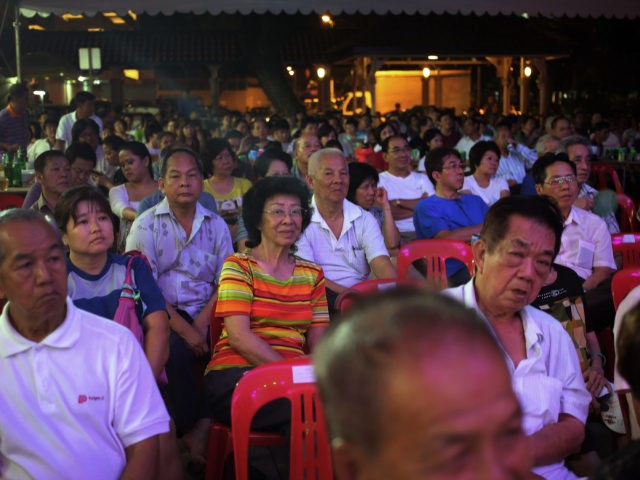Singapore’s Health Ministry announced Friday it will ease Chinese coronavirus restrictions across the city-state for vaccinated people starting August 10.
The relaxed virus protocol will allow public and private venues to increase their capacity allowances for large-scale events such as weddings, religious worship services, live performances, and spectator sports. Large events may increase their attendance caps to 500 people if all participants are fully vaccinated against the Chinese coronavirus.
“The limit will be increased to 1,000 from August 19 if the COVID-19 [Chinese coronavirus] situation remains under control,” Singapore’s Health Ministry said Friday. If attendees of large events are not fully vaccinated against the Chinese coronavirus, “only 50 of them will be allowed without pre-event testing,” according to the new rules.
“Wedding receptions will be allowed from August 10, with up to 250 people in groups of five attendees per table if all are fully vaccinated,” the Health Ministry said on August 6.
“Unmasking and singing or playing of wind instruments at live performances may resume for vaccinated performers,” the Ministry further announced.
Cinemas may also increase capacity limits starting next Tuesday. Restaurants may allow in-person dining for parties as large as five if the group’s members are all vaccinated against the Chinese coronavirus. Unvaccinated restaurant patrons may only dine in groups of two.
Singapore immigration officials on August 10 will resume entry approvals for work pass holders and their dependants from countries considered at “higher-risk” for the Chinese coronavirus, Singapore’s Ministry of Manpower announced on August 6. Work pass holders and their dependants must be fully vaccinated before Singapore will allow them into the country. Singapore’s government currently considers “all countries and regions other than New Zealand, Brunei, China, Hong Kong, Macau, and Taiwan” at “higher-risk” for the Chinese coronavirus, according to the Straits Times.
Singapore’s decision to ease its anti-virus measures comes despite a significant rise in its Chinese coronavirus caseload in recent weeks. The city-state’s coronavirus tally increased 50 percent last week (July 25-31) to 902 cases compared to the previous week (July 18-24), according to an update by Singapore’s Ministry of Health on July 27.
Singapore aims to return to normalcy despite its Chinese coronavirus caseload because its leaders have “come to the realization with many other countries that this virus has become endemic, like all other pandemics in history,” Professor Paul Tambyah, president of the Asia Pacific Society of Clinical Microbiology and Infection, told CNA on July 28.
“The focus then should be on protecting the vulnerable and preserving the healthcare system rather than trying to aim for zero COVID-19 [Chinese coronavirus], which is practically unattainable without paying a huge price in terms of economics, mental health and having a severe impact on the rest of the healthcare system,” he said.

COMMENTS
Please let us know if you're having issues with commenting.